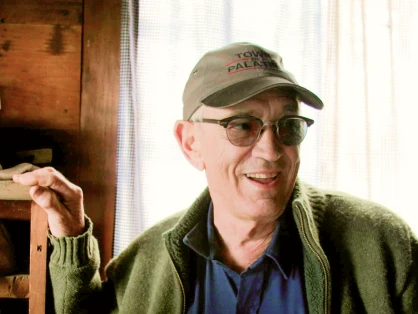Sometime during 1952 I became acquainted with St. Johnsville veterinarian Fred Cairns and Herby Mueller. Our common interest was old guns. We spoke several times about starting an organization composed of people with a like interest. Fred Cairns sent several postcards to prospective members inviting them to a meeting to be held at the VFW room over the old stone store on the corner of Main Street and Kingsbury Avenue in St. Johnsville. The meeting was held on March 4, 1953 with twelve members in attendance (Fred Wagner, Herbert Smith, Fred Cairns, Max Haak, B. R. Kiefling, Harold Green, John Warn, James Triumpho, Richard Mueller, Donald Nellis, Herbert Mueller, and Willis Barshied). The first officers were Willis Barshied, Jr., President; John Warn, Vice President; Herbert Mueller, Secretary, and Fred Cairns, Treasurer. Thus the “Tryon County Muzzle Loaders” cam into existence and continued to be until a few years after “Fort Klock Historic Restoration” was founded in 1964. Other prospective members were soon asked to join the Tryon County Muzzle Loaders. Meetings continued to be held at the VFW but an effort was underway to find a more permanent meeting place and a location for a rifle range. Fort Klock was soon proposed as a possible home for our organization. Even though the 1750 building was rapidly falling into ruin, it seemed a most appropriate location for our headquarters. Those members from St. Johnsville who knew Alex Don, the owner of Fort Klock seemed to be sure that the Fort was not obtainable. For some time I had been told that Alex Don owned an old muzzle loading target rifle that had been made by St. Johnsville millwright and gunsmith, John Howe, about the time of the Civil War. I was anxious to see that old rifle.
In late spring 1953, I decided it was time that I should meet Alex Don. I stopped at his Center Street home. I was 23 years old. Alex was well beyond mid-life. He was an imposing man, huge in stature and somewhat ‘gruff’ appearing. It was very evident that this man was not someone who could be pushed into anything. He had a very outspoken manner. I asked him if I could see his old rifle. He told me that I was the only one who really appeared interested in it. That same day, I very carefully approached the subject of the fast-deteriorating Fort Klock. He told me, in no uncertain terms, that he had been approached by another person about getting the Fort for an organization that was not historically oriented. He seemed to have an intense dislike for that person and refused to discuss it with him. This person was not known to me. I remember well what Alex said that day and I remember what my reply was. He made it clear that he would not sell his ancestor’s home. I told him our fledgling organization didn’t have anything to buy it with anyway.
Alex received title to the property by purchasing it at tax sale and by foreclosure of a mortgage his mother held. It was through his mother’s family that he was related to the Klocks. Allex told me that after he had taken title to the Fort in 1936 he had rented it to several families as a home. As the property deteriorated, he then gave the rent of this property to others until it became unlivable. Then it stood vacant as time and vandals did further damage.
I said, “Mr. Don, do you expect to replace these broken doors and windows in an effort to keep the building from falling down?” His reply was that he could no longer do it. I said to him, “You appear to have a great interest in the Fort and say you cannot preserve it. I find it hard to understand why you would not let someone else try to save it. That day began a dialog between Alexa and I that made it very clear to one another what our thinking was. I also became acquainted with Mrs. Don, who became and remained a friend to our organization for many years. It was through her generosity and foresight that we received a deed to Fort Klock in later years.
My initial meeting with Alex led to tours of the Fort property and sharing of many of his memories. The dialogues produced a long-term lease on September 20, 1954. Alex Done saw Fort Klock transformed from a deteriorating building to a sound structure within his lifetime. His friendship tiwth me and out organization remained for the rest of his life. On the day of Alex’s funeral, Mabel Don told me that he had thought a lot of me. I am sure that was true just as I felt he was my friend.
After 50 years I still remember how an old rifle brought two people together and led to a preservation effort at Fort Klock, which remains to this present day. Severl months after Alex died, his brother, Frank, and nephew, Bill, told me that no family member was as interested in the old rifle and that I could buy it. The gun became and continues to be one of my cherished possessions.


